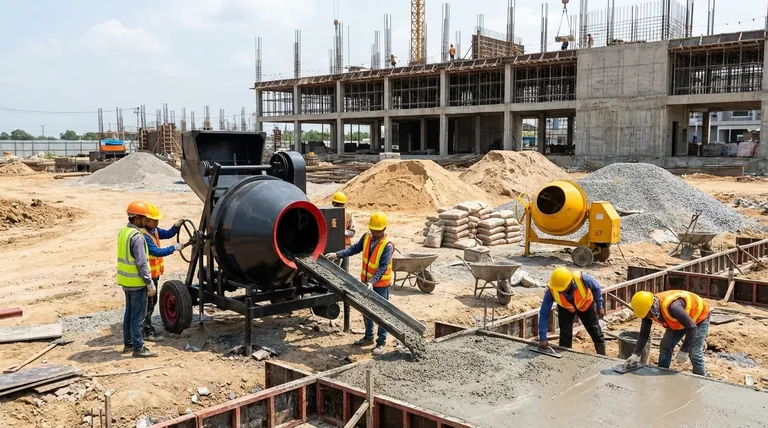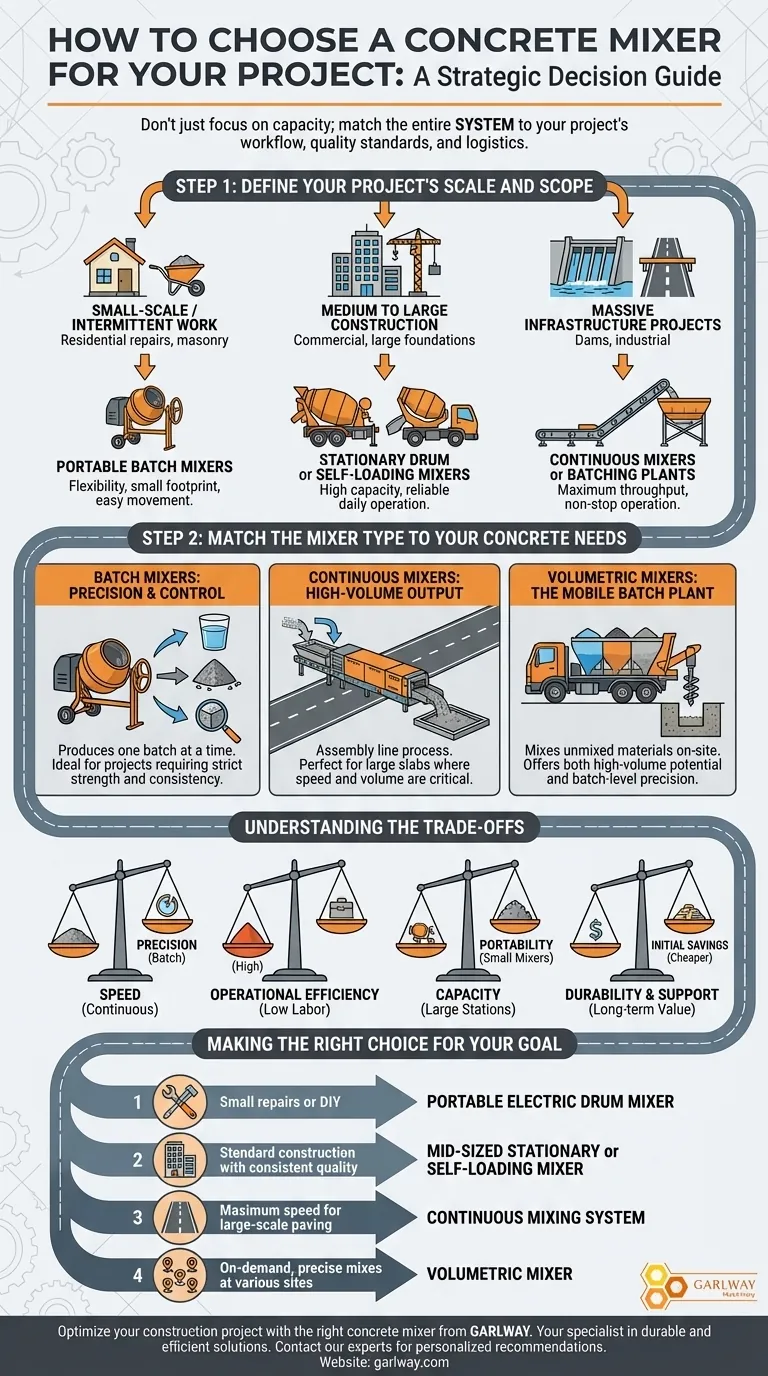To choose the right concrete mixer, you must evaluate your decision based on four primary factors: the overall size and scale of your project, the specific volume and type of concrete needed, the logistical constraints of your worksite like portability and power, and the required level of mix precision. For small, intermittent jobs, a portable batch mixer is often sufficient, whereas large-scale projects demand the high-volume output of continuous or stationary systems.
The most common mistake is focusing only on mixer capacity. The correct approach is to match the entire mixing system—including type, power, and mobility—to the specific workflow, quality standards, and logistical realities of your project.

Step 1: Define Your Project's Scale and Scope
The first step is a realistic assessment of your operational demands. The required volume and frequency of concrete production will immediately narrow your options.
For Small-Scale or Intermittent Work
This category includes residential repairs, small foundations, or masonry work. The key is flexibility, not high output.
Portable batch mixers are the standard choice. Their small footprint and ability to be moved easily around a site make them ideal for tasks where you need small, manageable quantities of concrete at different locations.
For Medium to Large Construction
This applies to commercial buildings, large foundations, or multi-unit residential projects where consistent, significant pours are scheduled.
Stationary drum mixers or self-loading mixers are common. They offer a much larger capacity and are designed for reliable, day-in-day-out operation. While less mobile than portable units, they provide the volume needed to keep a professional crew working without interruption.
For Massive Infrastructure Projects
Think of dams, highways, or large industrial facilities. The primary driver here is maximum throughput and continuous operation.
Continuous mixers or dedicated batching plants are necessary. These systems are designed to produce a constant, uninterrupted flow of concrete at an extremely high rate, which is essential for massive, non-stop pours.
Step 2: Match the Mixer Type to Your Concrete Needs
Beyond size, different mixers are engineered for different tasks and levels of precision. Understanding the fundamental types is crucial for ensuring mix quality.
Batch Mixers: For Precision and Control
Batch mixers, like a common drum mixer, produce concrete one batch at a time. This method provides excellent control over the mix ratios of water, aggregate, and cement.
This makes them ideal for projects where strength and consistency are critical, as each batch can be precisely measured and verified.
Continuous Mixers: For High-Volume Output
A continuous mixer is like an assembly line. Materials are continuously fed into one end, mixed, and discharged out the other.
Their strength is speed and volume, making them perfect for large slabs or paving where the demand for concrete is relentless. However, they offer less precise control over individual mix ratios compared to batch systems.
Volumetric Mixers: The Mobile Batch Plant
Volumetric mixers carry unmixed materials (sand, stone, cement, water) in separate compartments. The mixing occurs on-site to exact specifications.
This provides the best of both worlds: high-volume potential and batch-level precision. They are exceptionally useful for remote sites or projects requiring multiple, different concrete mix designs on the same day, as there is no waste from unused hot batches.
Understanding the Trade-offs
Choosing a mixer involves balancing competing priorities. Being aware of these trade-offs is the mark of a sound decision.
Speed vs. Precision
Continuous mixers offer unmatched speed, but batch mixers provide superior control over mix quality. If your project has strict engineering specifications, the precision of a batch or volumetric mixer is non-negotiable.
Upfront Cost vs. Operational Efficiency
A larger, more automated mixer has a higher initial cost but can dramatically reduce labor expenses and project timelines. Conversely, a smaller mixer may be cheaper to buy but could create costly bottlenecks if it can't keep up with your crew's pace.
Portability vs. Capacity
The most portable mixers have the smallest capacity. You must map out your worksite and determine if it's more efficient to bring small amounts of concrete to multiple spots or to set up a central, high-capacity station.
Durability and Manufacturer Support
A cheaper mixer may not withstand the rigors of a demanding job site. Consider the manufacturer's reputation, the availability of spare parts, and the quality of post-sales service. Downtime due to a broken machine is often far more expensive than the initial savings on a cheaper unit.
Making the Right Choice for Your Goal
Your final decision should be guided by your primary objective. Filter your options through the lens of what matters most for your project's success.
- If your primary focus is small repairs or DIY projects: A portable, electric drum mixer offers the best balance of cost, mobility, and ease of use.
- If your primary focus is standard construction with consistent quality: A mid-sized stationary batch mixer or a self-loading mixer provides the necessary capacity and control.
- If your primary focus is maximum speed for large-scale paving or foundations: A continuous mixing system is the only choice for high-volume, non-stop production.
- If your primary focus is on-demand, precise mixes at various job sites: A volumetric mixer provides unparalleled flexibility and eliminates the waste of pre-mixed concrete.
Ultimately, selecting the right mixer is an investment in your project's efficiency and quality.
Summary Table:
| Project Scale | Recommended Mixer Type | Key Features |
|---|---|---|
| Small-Scale / Intermittent Work | Portable Batch Mixer | Flexibility, easy movement, small quantities |
| Medium to Large Construction | Stationary Drum / Self-Loading Mixer | High capacity, reliable daily operation |
| Massive Infrastructure Projects | Continuous Mixer / Batching Plant | Maximum throughput, non-stop operation |
Optimize your construction project with the right concrete mixer from GARLWAY.
As a specialist in construction machinery, GARLWAY provides durable and efficient solutions—including winches, concrete mixers, and batching plants—tailored to the needs of construction companies and contractors worldwide. Our expertise ensures you get the perfect equipment to enhance productivity, reduce downtime, and maintain high-quality standards.
Ready to find your ideal mixer? Contact our experts today for personalized recommendations and reliable support!
Visual Guide

Related Products
- Portable Electric Concrete Mixer Machine for Cement Mixing
- Portable Ready Mix Concrete Mixer Equipment
- Portable Concrete Mixer Machine Equipment for Mixing Concrete
- Portable Electric Small Cement Mixer Concrete Machine
- JZC400 Mobile Small Concrete Mixer Cement Mixer Machine
People Also Ask
- How does the portable concrete mixer optimize time in small construction projects? Gain On-Demand Control & Efficiency
- How much concrete can you pour with a portable mixer? Find the Perfect Fit for Your Project
- How much concrete can you mix in a portable mixer? Maximize Efficiency on Small Jobs
- Why is it necessary to use a portable concrete mixer? Gain Total Control & Efficiency
- How much does a portable concrete mixer hold? A Guide to Choosing the Right Capacity



















